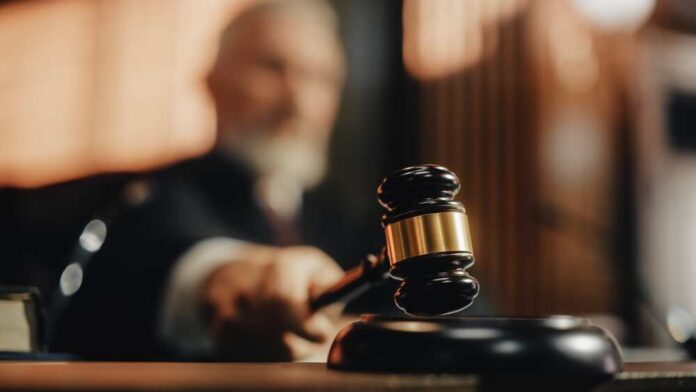
A rogue D.C. judge believes he has the authority to keep Venezuelan gang members in YOUR neighborhood while handcuffing the President’s power to protect Americans.
America finds itself in a constitutional showdown as D.C. circuit court judge James Boasberg has blocked the Trump administration from deporting suspected Tren de Aragua gang members, igniting fierce debate over separation of powers. The White House has labeled Boasberg a “Democrat activist” while Republicans condemn this as judicial overreach into presidential authority. Trump faces an unprecedented number of nationwide injunctions against his immigration policies, prompting GOP lawmakers to pursue legislative remedies. This clash highlights the escalating tension between executive power and judicial activism that threatens to derail the administration’s border security agenda.
Unelected Judges vs. Presidential Authority: The Constitution at a Crossroads
When a district court judge can singlehandedly halt the deportation of suspected foreign gang members, we’ve officially entered bizarro world. Judge James Boasberg’s recent ruling blocking the Trump administration from deporting suspected Venezuelan gang members isn’t just judicial activism – it’s judicial insurrection. This unelected judge has effectively decided that his personal opinion carries more weight than the constitutional authority of the President of the United States to protect American citizens from foreign threats. The founding fathers are spinning in their graves fast enough to power the entire Eastern Seaboard.
White House press secretary Karoline Leavitt didn’t mince words when addressing this judicial power grab, calling out Boasberg’s overreach for what it is. “The judge in this case is essentially trying to say that the president doesn’t have the executive authority to deport foreign terrorists from our American soil. That is an egregious abuse of the bench. This judge cannot, does not have that authority.” The administration has maintained that deportation flights took off before Boasberg’s order – a point that’s now being disputed in court. Meanwhile, Americans are left wondering why a judge is working so hard to keep dangerous criminals in our communities.
The Unprecedented Wave of Judicial Obstruction
If you thought the judicial resistance to Trump’s first term was bad, buckle up. President Trump has already faced approximately 15 nationwide injunctions in his new term – more than any of his predecessors faced during their entire presidencies. This isn’t coincidence; it’s coordinated legal warfare. Liberal organizations have mastered the art of forum-shopping – filing lawsuits in jurisdictions with Democrat-appointed judges who are all too happy to substitute their policy preferences for the law. The result? A handful of district judges wielding veto power over presidential decisions affecting 330 million Americans.
Senate Judiciary Committee Republican members are finally addressing this crisis. Senator Chuck Grassley has announced upcoming hearings focused specifically on these nationwide injunctions that hamstring executive action. The hearings will explore legislative solutions to rein in activist judges who’ve appointed themselves as shadow presidents. But let’s be honest – how did we get here? Many of these judges were confirmed with bipartisan support, with some Republicans apparently asleep at the wheel during the confirmation process. As McCarthy points out, the GOP dropped the ball by not fighting harder against Biden’s judicial appointments.
Constitutional Crisis or Constitutional Correction?
President Trump hasn’t been shy about expressing his frustration with judicial overreach. He rightly called Boasberg a “radical left lunatic judge” who is trying to “assume the role of president.” When judges start dictating immigration policy from the bench, they’re not interpreting the law – they’re making it. This is exactly what the separation of powers was designed to prevent. The executive branch, not the judiciary, is constitutionally tasked with enforcing our immigration laws and protecting our borders from foreign threats.
The left’s hypocrisy is truly stunning. The same people who cheered when Obama ignored immigration laws are now clutching their pearls at the thought of Trump exercising his lawful authority. They claim Trump is assaulting the rule of law, but where was their concern when Biden’s open border policies violated existing immigration statutes? Congressman Van Orden gets it right – judges who exceed their constitutional authority need to go. Congress has tools at its disposal, including jurisdiction-stripping legislation and, in extreme cases, impeachment. Rep. Anna Paulina Luna promised that lawmakers will “do everything that we can with our legislative toolkit” to address this judicial power grab.
What’s Really at Stake: American Safety or Judicial Supremacy?
Let’s cut through the legal jargon and get to the heart of the matter: Americans are less safe when violent gang members remain in our communities. Period. The Tren de Aragua gang has been linked to murders, extortion, human trafficking, and drug crimes across multiple states. These aren’t innocent migrants seeking a better life – they’re hardened criminals who prey on the vulnerable, including legal immigrants. By blocking their deportation, Judge Boasberg is choosing to prioritize the theoretical rights of foreign criminals over the actual safety of American citizens.
“If a President doesn’t have the right to throw murderers, and other criminals, out of our country because a radical left lunatic judge wants to assume the role of president, then our country is in very big trouble, and destined to fail!” – Donald Trump
While legal experts warn about constitutional crises, the real crisis is happening in American neighborhoods plagued by violent crime committed by individuals who shouldn’t be in this country in the first place. The administration is right to appeal this ruling all the way to the Supreme Court if necessary. Rep. August Pfluger summed it up perfectly: “I think the administration’s doing the right thing by fighting it legally.” The courts may have the final say on legal interpretations, but they don’t have the right to usurp the President’s core constitutional duties. The battle lines are drawn, and the outcome will shape the balance of power in our government for generations to come.




















